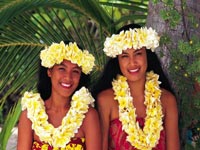Visit worldtravels.com for the full guide to Tahiti and French Polynesia. Build a complete Tahiti and French Polynesia travel guide and email to your clients - sign up for a trial subscription of World Travels Pro.
Tahiti and French Polynesia

Captivating Tahiti and her 118 attendant islands and atolls, all radiating with iridescent green and turquoise, make up the country of French Polynesia, a French overseas territory that is spread across an area of the South Pacific that is as big as western Europe.
The earliest explorers thought they had found paradise on earth when they came across these picture-perfect islands, and today's travellers are no less entranced by the volcanic mountain peaks clothed in lush tropical vegetation and exotic flowering plants, the coral reefs, warm waters, white sand beaches and stunning turquoise lagoons. Add to this the warm hospitality offered by the friendly locals, a collection of world-class resorts, spas, fine restaurants, nightclubs, vibrant markets and enticing boutiques and one would imagine the islands would be over-run with exuberant vacationers. It is surprising then, to discover that there are more hotel rooms in a typical Las Vegas hotel than on all the islands of French Polynesia, and that Hawaii receives more visitors in 10 days than Tahiti does in a year. This means it is possible to tuck a tiare (Tahiti's national fragrant white flower) behind your ear, pack your pareu (sarong) and swimsuit, and head off to find your own idyllic piece of Polynesian paradise, which will doubtless have a melodic ancient name meaning something like 'island of the long sky' or 'place of the double rainbow'.
Climate
French Polynesia enjoys tropical, warm and humid weather all year round, averaging eight hours of sunshine per day over a year. The islands experience a rainy season, generally between late October and early March, when cloudy skies and brief heavy rain showers can occur. The rest of the year rain is rare and temperatures constantly high, tempered sometimes by refreshing breezes. The water temperature ranges from 79°F to 84°F (26°C to 29°C) making for extremely pleasant bathing all year round.
Money
The unit of currency in French Polynesia is the French Pacific Franc (XPF), divided into 100 centimes. The exchange rate is fairly stable as it is linked to the Euro. Banks throughout the islands are open mainly on weekdays only and are the best place to change foreign currency; rates of exchange are not as good at hotels. There are ATMs on a few of the islands, but shouldn't be relied upon. Most hotels and resorts will exchange travellers cheques in US$ or Euros, and credit cards and US currency is readily accepted on the main islands. Tourism taxes are levied for accommodation and activities.
Passport Visa
All foreigners entering French Polynesia must hold return tickets or documents for onward travel to two successive destinations. A passport valid for three months after the date of entry is also required. Extensions are possible.
Entry Requirements
- US citizens require a passport valid for three months after intended travel. No visa is required for a stay of up to three months in any six month period.
- British nationals require a passport valid for three months after intended travel. No visa is required for a stay of up to three months. Visa extensions can be obtained from the relevant authorities two months after arrival.
- Canadians require a passport valid for three months after intended travel. No visa is required for a stay of up to three months in any six month period.
- Australians require a passport valid for three months after intended travel. No visa is required for a stay of up to three months in any six month period.
- South Africans require a passport valid for three months after intended travel. A visa is required for South African citizens wishing to travel to Tahiti and French Polynesia.
- Irish citizens require a passport valid for three months after intended travel. No visa is required for a stay of up to three months. Visa extensions can be obtained from the relevant authorities two months after arrival.
- New Zealand nationals require a passport valid for three months after intended travel. No visa is required for a stay of up to three months in any six month period.
Health
A yellow fever vaccination is required for travellers to French Polynesia arriving from an infected area. Immunisation against hepatitis A is recommended, and the territory is subject to increasing outbreaks of dengue fever. A typhoid vaccine is also suggested for most travellers (except short-term business travellers or cruise ship passengers). Tap water in hotels is safe to drink, but bottled water is also freely available throughout the islands. Tahiti has good health facilities with pharmacies and a large government hospital. There are a few private doctors and clinics in the outer islands. The only decompression chamber is at Papeete. Medical insurance is recommended for travellers.
Embassy Consulates
- Embassy of France, Washington DC, United States: +1 202 944 6000.
- Embassy of France, London, United Kingdom: +44 (0)20 7073 1000.
- Embassy of France, Ottawa, Canada: +1 613 789 1795.
- Embassy of France, Canberra, Australia: +61 (0)2 6216 0100.
- Embassy of France, Pretoria, South Africa: +27 (0)12 425 1600.
- Embassy of France, Dublin, Ireland: +353 (0)1 277 5000.
- Embassy of France, Wellington, New Zealand: +64 (0)4 384 2555.
Foreign Embassies
- United States Embassy, Suva, Fiji (also responsible for French Polynesia): +679 331 4466.
- British Embassy, Paris, France (also responsible for French Polynesia): +33 (0)1 4451 3100.
- Canadian High Commission, Wellington, New Zealand (also responsible for French Polynesia): +64 (0)4 473 9577
- Australian Consulate-General, Noumea, New Caledonia (also responsible for French Polynesia): +687 272 414.
- New Zealand High Commission, Alofi, Niue: +683 4022.







